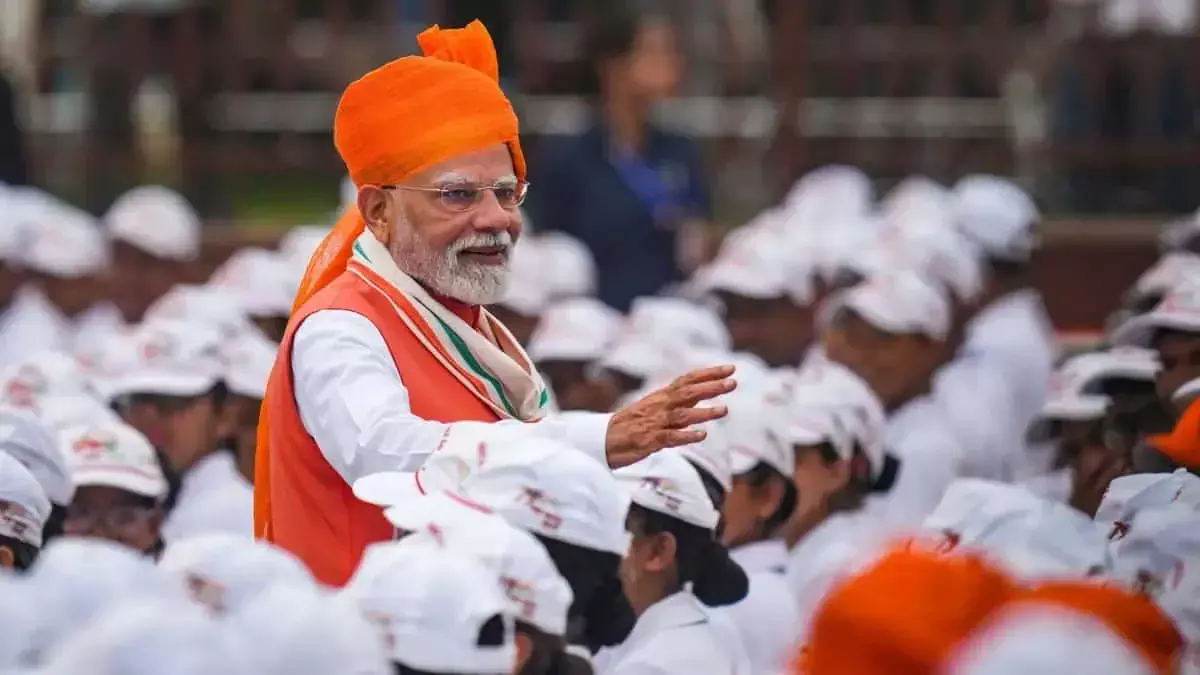I-Day: 'PM Modi’s speech was given during a crucial period for world in which we live’
‘There are also some rumours that the BJP and the RSS are not working together’

Andy Marino, a biographer of Prime Minister Narendra Modi, wrote in his book that in September 2006, a party member spoke anonymously to a journalist at the BJP national headquarters in Delhi. “We’re just biding time till the real leader can take over and can fix the mess,” that man told the journalist. He also added that “Only Narendra Bhai can save us.” Modi was announced as the BJP’s official prime ministerial candidate seven years after the rumoured admission that the party needed him to fix the “mess” and after months of conjecture following his appointment as the chairman of the BJP election campaign committee for the 2014 Lok Sabha elections. The years after 2014 seemed to fly by Narendra Modi gave his 12th speech from the Red Fort during the second half of his tenure on Wednesday. The speech was given during a crucial period for the world in which we live. First, demonstrating his unpredictable behaviour, the US President Donald Trump chose to launch an irrational trade war against India and the entire world during his second term in office. China is just as embarrassed and agitated as the US’s longstanding diplomatic allies, including Canada, Japan, the European Union, and other European nations. In such a scenario, Modi is continuously attempting to counter Trump’s isolationist policies. Even if Modi tries to avoid displaying a reflexive response amid Trump’s numerous pronouncements, a handful of his statements do the job by expressing appropriate criticism.
The address given by Modi is far more inclusive. His speech is intended for a variety of Indian populations, ranging from the industrial sector to the agricultural land. He underlined his belief in the self-reliance philosophy in an organised manner. For this reason, he proclaimed the ‘Sudarshan Chakra’ mission to reinforce and advance the weapon system, and he instituted the self-reliance policy to produce semiconductors domestically to demonstrate strength to the world. Additionally, he presented a roadmap for creating a “Vikshit Bharat,” which he plans to pursue by 2047. He made three references to Pakistan in his speech, citing Operation Sindoor as an example of how India was able to teach Pakistan a lesson. In addition, he has demonstrated that we are handling the proxy war and combating not only Pakistani terror but also Maoist and Naxalite terror. Moreover, we have already rejected Pakistan’s demands for an external threat and nuclear blackmail. Once Bastar was a Naxal stronghold, India is now effectively transitioning from the red to the green corridor by working for the development of the indigenous tribal people. In his discussion of the national interests and ideology of the BJP and RSS, he also brought up two other crucial considerations. He claimed that because infiltration is impeding the democratic populace of India, the administration is doing everything it can to stop the infiltrators. Although it may appear to be a political objective ahead of the 2026 elections in West Bengal and Assam, the BJP and RSS truly had this attitude for a long time. Infiltration is about identifying unlawful inhabitants and taking appropriate action against them, not about Bengali or non-Bengali people. As a prime minister and not a party leader, Narendra Modi gave a speech that was neutral and did not refer to Muslim infiltrators or Hindu refugees.
In the later part of his speech, Modi thanked the RSS. It is important to remember that he was formerly an RSS propagandist. The BJP was founded in 1980, and the RSS was founded in 1925. The RSS operates as an NGO, but it supports the BJP in every way by allowing its members to serve as elected or non-elected coordinators. Modi visited the RSS headquarters recently. Mohan Bhagwat was present to meet with the Prime Minister as well. There are also some rumours that the BJP and the RSS are not working together. PM Modi has now firmly cemented the coordination with RSS by expressing gratitude. The RSS head always gives a speech during Dussehra, and this year the organisation is celebrating its centennial. It seems likely that Mohan Bhagwat will carry on with this tradition this year as well. In addition, Modi talked about the stock market meltdown and unemployment, which led him to create a job program for one lakh crore young people to end the economic crisis in India. He provided a clear roadmap for resolving the ongoing issues that our country is currently facing.
(The writer is a senior journalist. Views expressed are personal)



